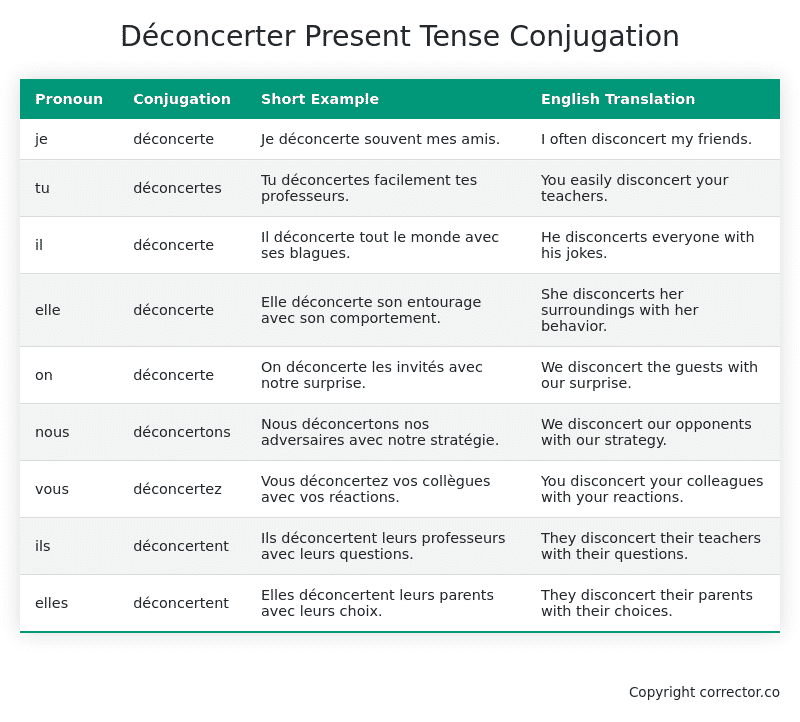Le Present (Present Tense) Conjugation of the French Verb déconcerter
Introduction to the verb déconcerter
to disconcert; to unsettle
Pronunciation: day-con-ser-tay
Déconcerter comes from the French verb “concerter” which means “to agree” or “to coordinate”. The prefix “dé-” adds a negative or opposite meaning, so déconcerter can be understood as “to disconcert” or “to unsettle”. It is primarily used to describe a state of confusion, surprise, or bewilderment.
Examples:
- Sa réponse inattendue m’a déconcerté. (His unexpected answer disconcerted me.)
- Le bruit incessant du chantier déconcerte les habitants. (The constant noise from the construction site unsettles the residents.)
- La complexité de la question les a déconcertés. (The complexity of the question puzzled them.)
Déconcerter – About the French Present Tense
To take a deep dive into all the French tenses then see our article on Mastering French Tense Conjugation.
Common Everyday Usage Patterns For Le Present
Interactions with Other Tenses
Table of the Present Tense Conjugation of déconcerter
| Pronoun | Conjugation | Short Example | English Translation |
|---|---|---|---|
| je | déconcerte | Je déconcerte souvent mes amis. | I often disconcert my friends. |
| tu | déconcertes | Tu déconcertes facilement tes professeurs. | You easily disconcert your teachers. |
| il | déconcerte | Il déconcerte tout le monde avec ses blagues. | He disconcerts everyone with his jokes. |
| elle | déconcerte | Elle déconcerte son entourage avec son comportement. | She disconcerts her surroundings with her behavior. |
| on | déconcerte | On déconcerte les invités avec notre surprise. | We disconcert the guests with our surprise. |
| nous | déconcertons | Nous déconcertons nos adversaires avec notre stratégie. | We disconcert our opponents with our strategy. |
| vous | déconcertez | Vous déconcertez vos collègues avec vos réactions. | You disconcert your colleagues with your reactions. |
| ils | déconcertent | Ils déconcertent leurs professeurs avec leurs questions. | They disconcert their teachers with their questions. |
| elles | déconcertent | Elles déconcertent leurs parents avec leurs choix. | They disconcert their parents with their choices. |
Other Conjugations for Déconcerter.
Le Present (Present Tense) Conjugation of the French Verb déconcerter (You’re reading it right now!)
Imparfait (Imperfect) Tense Conjugation of the French Verb déconcerter
Passé Simple (Simple Past) Tense Conjugation of the French Verb déconcerter
Passé Composé (Present Perfect) Tense Conjugation of the French Verb déconcerter
Futur Simple (Simple Future) Tense Conjugation of the French Verb déconcerter
Futur Proche (Near Future) Tense Conjugation of the French Verb déconcerter
Plus-que-parfait (Pluperfect) Tense Conjugation of the French Verb déconcerter
Passé Antérieur (Past Anterior) Tense Conjugation of the French Verb déconcerter
Futur Antérieur (Future Anterior) Tense Conjugation of the French Verb déconcerter
Subjonctif Présent (Subjunctive Present) Tense Conjugation of the French Verb déconcerter
Subjonctif Passé (Subjunctive Past) Tense Conjugation of the French Verb déconcerter
Subjonctif Imparfait (Subjunctive Imperfect) Tense Conjugation of the French Verb déconcerter
Conditionnel Présent (Conditional Present) Tense Conjugation of the French Verb déconcerter
Conditionnel Passé (Conditional Past) Tense Conjugation of the French Verb déconcerter
Conditionnel Passé II (Conditional Past II) Tense Conjugation of the French Verb déconcerter
L’impératif Présent (Imperative Present) Tense Conjugation of the French Verb déconcerter
L’impératif Passé (Imperative Past) Tense Conjugation of the French Verb déconcerter
L’infinitif Présent (Infinitive Present) Tense Conjugation of the French Verb déconcerter
L’infinitif Passé (Infinitive Past) Tense Conjugation of the French Verb déconcerter
Le Participe Présent (Present Participle) Tense Conjugation of the French Verb déconcerter
Le Participe Passé (Past Participle) Tense Conjugation of the French Verb déconcerter
Struggling with French verbs or the language in general? Why not use our free French Grammar Checker – no registration required!
Get a FREE Download Study Sheet of this Conjugation 🔥
Simply right click the image below, click “save image” and get your free reference for the déconcerter present tense conjugation!

I hope you enjoyed this article on the verb déconcerter. Still in a learning mood? Check out another TOTALLY random French verb present conjugation!


